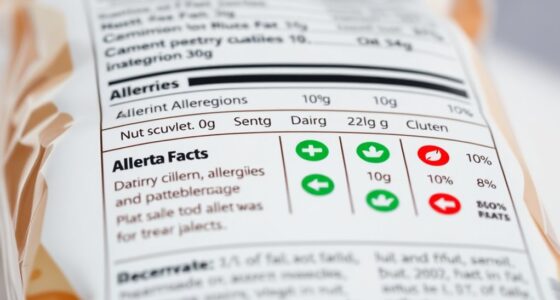To build relationships with health inspectors, familiarize yourself with local regulations and maintain a clean, organized facility that shows professionalism. Communicate openly, listen carefully to feedback, and proactively share information about your operations. Keep records up to date and address concerns promptly to demonstrate responsibility. By fostering trust and transparency, you’ll create a positive rapport that makes future inspections smoother. Want to learn more ways to strengthen these connections? Keep exploring these strategies.
Key Takeaways
- Familiarize with local health regulations and inspection protocols to demonstrate preparedness.
- Communicate respectfully, listen actively, and seek clarification to build trust with inspectors.
- Maintain an organized, clean, and well-documented facility to show professionalism and compliance.
- Engage in ongoing dialogue, share records, and address concerns promptly for a positive rapport.
- View inspections as opportunities for improvement, fostering transparency and a culture of safety.

Establishing a positive relationship with health inspectors can considerably benefit your business. When you approach inspections with transparency and professionalism, it sets a foundation of trust that can make future reviews smoother and less stressful. One of the key ways to do this is by thoroughly understanding inspection protocols. Familiarize yourself with local health regulations, standards, and expectations before an inspector arrives. This proactive approach demonstrates your commitment to maintaining high standards and helps you address potential issues beforehand. Knowing what inspectors look for allows you to prepare your staff and your facility, reducing the chances of violations and ensuring compliance.
Effective communication strategies are equally essential. When interacting with health inspectors, be clear, respectful, and cooperative. Listen carefully to their feedback and ask clarifying questions if needed. Showing willingness to listen and learn fosters mutual respect and can turn an inspection from a stressful event into an opportunity for improvement. Keep records of past inspections and your corrective actions, which you can share to show your dedication to continuous improvement. This transparency helps build credibility and reassures inspectors that you’re serious about maintaining standards.
Building rapport with inspectors also involves regular, open communication outside of scheduled inspections. Welcome their feedback and view their visits as an opportunity to learn, rather than just a compliance checkpoint. When you keep them informed about any changes in your operation or address concerns proactively, they’re more likely to see you as a responsible and cooperative partner. Establishing ongoing relationships creates a sense of familiarity and trust, which can lead to more constructive interactions and potentially more lenient evaluations if issues arise.
Additionally, maintaining a clean, organized, and well-documented facility signals your respect for inspection protocols and your commitment to safety. Consistency in following procedures and keeping your records up to date makes inspections less intrusive and demonstrates your professionalism. Remember, inspectors are there to ensure public safety, and they appreciate when businesses take proactive steps to meet and exceed regulatory standards.
Frequently Asked Questions
How Often Should I Expect Health Inspections?
You should expect health inspections based on your restaurant’s inspection frequency, which varies by location and previous compliance. Typically, inspections occur annually or semi-annually, but some areas may schedule them more or less often. To stay prepared, keep your restaurant scheduling organized and guarantee all standards are consistently met. Regular self-inspections can help you stay ahead, making each official inspection smoother and less stressful.
What Are Common Violations Inspectors Look For?
Think of a health inspector as a vigilant gardener inspecting your food safety garden. They look for common violations like improper food storage, dirty surfaces, and insufficient cleanliness standards. You should watch for mold, pests, and cross-contamination risks. Maintaining high standards of hygiene and proper food handling keeps your operation in the inspector’s good graces, ensuring your establishment stays compliant and your customers stay safe and satisfied.
Can I Request a Specific Inspector for My Visit?
Yes, you can request a specific inspector for your inspection by contacting the health department ahead of time. Building a personal rapport with inspectors can help make this process smoother, as they’re often willing to accommodate reasonable requests. When scheduling your inspection, mention your preference and explain any relevant reasons. Keep in mind, though, that inspectors’ availability may influence your request, so plan accordingly to ensure a smooth inspection process.
How Do I Handle Disagreements With an Inspector?
When disagreements arise with an inspector, use effective communication strategies to stay calm and respectful. Clearly explain your perspective, listen to their concerns, and ask for clarification if needed. Focus on conflict resolution by seeking common ground and showing willingness to cooperate. Remember, maintaining professionalism and open dialogue helps resolve issues smoothly, fostering a positive working relationship that benefits both parties and guarantees compliance.
Are There Penalties for Minor Violations?
If you’re wondering about penalties for minor violations, the severity of the violation influences penalty assessment. For example, a small sanitation lapse might result in a warning or a minor fine, but repeated minor violations can escalate. While penalties are less severe for minor violations, it’s essential to address issues promptly to prevent more serious consequences. Always review local regulations, as penalties vary based on violation severity and jurisdiction.
Conclusion
Building strong relationships with health inspectors can make a real difference in your business’s success. Stay transparent, respectful, and proactive in your communication. Remember, “A friend in need is a friend indeed”—by fostering trust and collaboration, you’ll find inspectors more willing to work with you rather than against you. Investing in these relationships isn’t just good practice; it’s a smart move for maintaining quality and ensuring smooth inspections.









